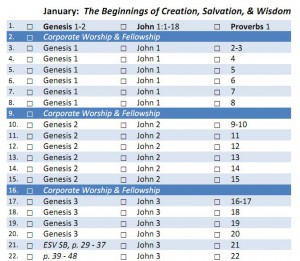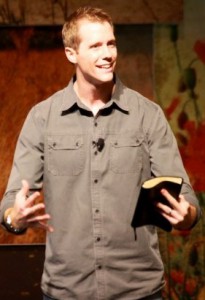 Justin Taylor recently made the post-to-end-all-posts about Bible reading plans; he has links there for just about every kind of approach you can imagine.
Justin Taylor recently made the post-to-end-all-posts about Bible reading plans; he has links there for just about every kind of approach you can imagine.
Too many options? No. A vacuum cleaner salesman once told me that out of all the vacuums on the market, the best one is the one you will actually use on a regular basis. Whichever one comes out of the closet and busts the dust is the best; the awesome multifunctional machine that you just can’t stand to drag out day after day is a bad vacuum. I didn’t buy his vacuum, but I took his advice and spiritualized it: The best Bible reading plan is the one you’ll actually use. So in that spirit, I want to pass along a new reading plan that a lot of the people at my church are doing in 2011. It’s not a plan to read the entire Bible in one year; it only covers about half of the Bible. What it is is a plan for using the Bible consistently throughout the year for a balanced Christian life.
 The plan is by John Rinehart, a member of Grace EvFree and a recent graduate of Talbot School of Theology. Check it out here. John explained the plan during a recent church service, and I asked him a few questions about it. Here are his answers.
The plan is by John Rinehart, a member of Grace EvFree and a recent graduate of Talbot School of Theology. Check it out here. John explained the plan during a recent church service, and I asked him a few questions about it. Here are his answers.
Q: What’s different about this Bible reading plan?
A: The first thing the reader will notice is that they’re not too far behind already. The plan begins with chapter 1 of Genesis and John being read and re-read everyday for the first week, followed by Genesis 2 and John 2 for the second week, and Genesis 3 and John 3 for the third week. It may look like a typo, but it’s not. Re-reading slows us down so that we seek to understand the Bible rather than merely complete a reading plan.
The second difference is the incorporation of articles from the ESV Study Bible. These articles, like the re-reading, are a tool to increase our understanding of the Bible. Understanding is different than hearing (or reading), and Jesus emphasized the eternal importance of understanding when he said, “When anyone hears the word of the kingdom and does not understand it, the evil one comes and snatches away what has been sown in his heart.” (Matt. 13:19)
The third difference is an emphasis on Jesus’ words. We read each of Jesus’ five discourses five times in the month of March. In September and October we focus on Jesus’ parables in Luke. All of Scripture is God-breathed, true, and profitable, but I want to be especially familiar with what the only Son of God said when he walked among us.
The fourth piece relates to Christmas and Easter. In the past I’ve found myself feeling spiritually unprepared to celebrate Jesus’ death and resurrection because I hadn’t been reflecting on passages like Isaiah 53, Luke 24, and 1 Corinthians 15. I’ve geared the reading in April and December to ramp up to these holidays.
Q: Why does this plan only lead us through half of the books of the Bible?
A: Two quotes I keep on my desk are these:
1) “Teaching habits is the key to discipleship”
2) “Nothing that does not occur daily will ever dominate your life.”
I’m not so concerned with helping others get through the whole Bible in the next 365 days, as good as that is. My concern is to develop and help others develop lifelong habits of reading and studying the Bible so that we understand God’s voice and learn how he would have us live. If we get a sense that God really does speak through his book to transform us by renewing of our minds, then we’ll keep mining every page until we see God face to face.
Q: Even though this plan only covers half of the books of the Bible, it directs us to read some chapters over and over. What benefits do you expect users to get from reading the same chapters repeatedly like that?
Last year I was asked to preach four sermons on the book of Philippians for a group of college students. To prepare I read the entire book of Philippians almost everyday for five weeks. When I stood up to preach I had the clear sense that I knew Philippians, not because I read a mound of commentaries or downloaded of an iPod full of sermons, but because I saw for myself what Philippians was about. Commentaries are helpful checks and balances, but should not substitute for learning to feed ourselves from God’s word. Great men of history (and today) who wrote commentaries and preached sermons were men who read and re-read God’s word until they had not only heard of God’s greatness with their ears, but seen him with their own eyes.
Q: This plan recommends using the ESV Study Bible, and even points to specific page numbers in that big book. Can people who don’t have the ESV Study Bible make use of the reading plan as well?
For a worthy investment of $31.49 the ESV Study Bible can be yours at Amazon.com. I’m kidding. One guy came up to me at In-N-Out Burger and asked what he was supposed to do with the plan since he just got a new NIV Bible. I told him that God’s word is God’s word in the NIV too. Fred, I won’t hold it against you if you decide to read through the plan in the original Greek & Hebrew. You’ll just miss out on a few helpful articles each month.
Q: Have you tried this whole plan out yet, or is this year going to be the first time through for you as well?
2011 is a test flight that I just happen to be taking quite a few others along on. But it’s God’s word so I don’t think I can screw up that bad.
The plan is available at Grace’s website.